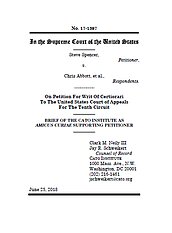Learn more about Cato’s Amicus Briefs Program.
Our primary federal civil rights statute, colloquially called “Section 1983,” says that any state actor who violates someone’s constitutional rights may be sued in federal court. But the Supreme Court has crippled the functioning of this statute through the judge-made doctrine of “qualified immunity.” This doctrine — at odds with both the text of the statute and the common law principles against which it was passed — immunizes public officials who commit illegal misconduct, unless they violated “clearly established law.” That standard is incredibly difficult for civil rights plaintiffs to overcome, because courts have required not just a clear legal rule, but a prior case on the books with functionally identical facts. Moreover, the Court has given government defendants a one-sided litigation advantage by permitting them to immediately appeal any denials of qualified immunity — even if the case has yet to go to a jury trial.
The Tenth Circuit’s recent decision in Spencer v. Abbott highlights the specific problems with this procedural aspect of qualified immunity.
Brian Maguire was undergoing methadone treatment for an opiate addiction before he entered a Utah state prison. But the prison did not permit Maguire to continue this treatment option, and he soon began experiencing methadone withdrawal. Shortly thereafter, Maguire reported that he was losing control over his left arm and hand — classic stroke symptoms — but was diagnosed as having only a muscle spasm. Later in his cell, Maguire lost control over his left arm and leg and began convulsing. Prison staff then diagnosed him as having a seizure, notwithstanding that Maguire remained lucid through the episode, and protested that something was seriously wrong. The staff then left Maguire in his cell overnight, ignoring his repeated pleas for emergency aid. It was not until the following morning that Maguire was taken to a hospital, where it was determined he had suffered a massive stroke.
Maguire brought a Section 1983 suit against the prison staff. The Defendants moved for summary judgment, but the district court held that—because of the patently unreasonable nature of the misdiagnosis and the repeated denials of Maguire’s pleas for emergency aid—a reasonable jury could infer that the Defendants acted with deliberate indifference to Maguire’s serious medical needs, in violation of the Eighth Amendment. Under traditional principles of civil procedure, Maguire would then have been entitled to a jury trial on his claims; the denial of a motion for summary judgment is generally not considered a “final decision,” which means appellate court lack jurisdiction to review such decisions before trial. But because the Defendants claimed qualified immunity, they got an immediate appeal. The Tenth Circuit then reversed, finding that the prison staff could not be held liable for their alleged misconduct — effectively ending Maguire’s case before he ever got to make it.
This case therefore illustrates how qualified immunity subverts traditional principles of civil procedure and basic fairness. Even though the Tenth Circuit purported to resolve Maguire’s claims on the merits (not on whether the law was “clearly established”), the only basis for its jurisdiction was a doctrine that lacks any proper legal foundation and imposes one-sided litigation risks and burdens on civil rights plaintiffs.
The petition in this case directly asks the Court to reconsider its qualified immunity jurisprudence, and the Cato Institute has filed an amicus brief in support of this request, as part of our ongoing campaign to challenge and roll back qualified immunity.


